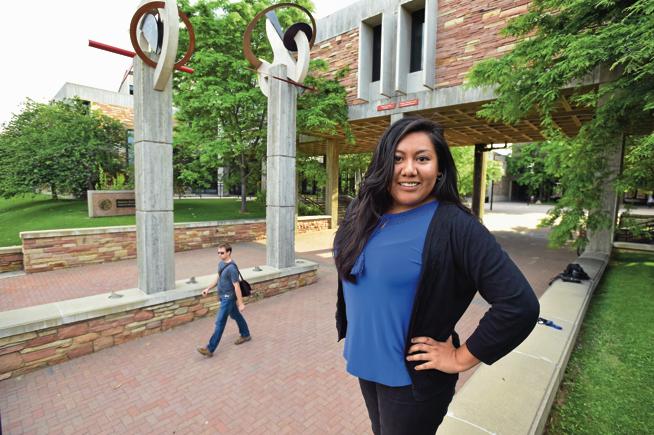By Elizabeth Hernandez
Daily Camera, Boulder, Colo.
WWR Article Summary (tl;dr) When Lilian Garcia heard about the University of Colorado’s adoption of the #ILookLikeAnEngineer campaign and hashtag, she knew she wanted to be involved to show students and the world that engineers go beyond the stereotypical well-off, white man.
Daily Camera, Boulder, Colo.
Lilian Garcia revels in watching people’s eyes bug out of their head when she tells them she’s an engineer.
The 23-year-old civil engineer graduated in May from the Engineering Plus program in the University of Colorado’s College of Engineering and Applied Sciences.
Garcia used to look around her classes and become discouraged when she couldn’t find anyone like herself — a first-generation college student and Latina from Aurora who was struggling academically.
“There were a lot of opportunities for me to give up and quit,” Garcia said. “But I fought back, and I said, ‘No. I’m going to be an engineer.'”
When she heard about CU’s adoption of the #ILookLikeAnEngineer campaign and hashtag, she knew she wanted to be involved to show students and the world that engineers go beyond the stereotypical well-off, white man.
The “I Look Like an Engineer” campaign originated in 2015 when Isis Wenger, a San Francisco-based engineer, was featured on a promotional billboard for her company.
Wenger began receiving backlash, with people insisting she had to be a hired model rather than an engineer because she was “too attractive” to be a “real engineer.” She kicked off the hashtag #ILookLikeAnEngineer for others to use to showcase the diversity in her chosen field.
The CU engineering school has embraced this message and is now encouraging its students to break those stereotypes, too.
“In engineering and science and innovation, it’s all about new ways of doing things and new ideas and thinking about problems differently,” said Phil Larson, assistant dean of CU’s College of Engineering and Applied Science.
“That’s part of what makes engineering such an exciting field. So getting the most diverse set of backgrounds is how you spur innovation. The College of Engineering and Applied Science has a close-knit, strong, diverse community, and that’s required to our mission.”
Sarah Banchefsky, a CU research associate in social psychology, got a grant to study the impact of the campaign. Initial evidence indicates that non-engineering students exposed to counter-stereotypical examples of engineers can reduce stereotypes about the career.
“I know students who have participated in the campaign seem really excited about it,” she said.
Garcia was a big fish in a small pond in Aurora’s William C. Hinkley High School, thriving in the intensive International Baccalaureate program. A lover of art and math, she decided engineering was her calling.
“I really enjoy using math and applying it to real world situations as well as using my creative side and designing things,” Garcia said. “Engineering is also a way to have a larger voice in my community. I would like to be a role model.”
But when she got to CU, that small pond swelled to an ocean.
Garcia realized, to her horror, she already was behind.
“I think the biggest challenge of being a first generation student of color was not having the financial resources a lot of students around me had,” she said. “Like I didn’t have the great mentors others had from having parents who were engineers or knew engineers or had money for tutoring and tuition and all that.”
To counter this, Garcia networked to find her own mentors. She worked multiple jobs during the school year and summers so she could pay her tuition and student loans, coming home to do school work and get a few hours sleep before waking up to do it all again.
In 2016, the CU engineering school enrolled around 4,600 undergraduate students. Of those, about 1,200 were women and around 650, or 14 percent, were underrepresented minorities.
Garcia seemed to meet all the qualities of an underrepresented student, and she often felt reminded of this.
In a class where she was one of two students of color in the room, Garcia recalls a professor consistently confusing the two minority students by handing them each other’s test results.
“It was really embarrassing for me because she was a better student than I was, and I was getting low scores, and she knew about a lot of them,” Garcia said. “She was respectful to not judge me or criticize me, but it definitely did make me feel uncomfortable.”
Garcia thought she hit rock bottom when she was placed on academic suspension, but she refused to let it stop her. After some soul searching, she switched from chemical engineering to the Engineering Plus program that allowed more flexibility in class choice.
It took her six years, but in May, Garcia was officially an engineering school graduate. Chatting recently from her Denver office, her pride radiated. She still encounters disbelief when she shares her profession, but now she has the degree to back it up.
She hopes, through the CU campaign, her story will resonate with an engineering student who needs a little support like she did.
“If they can learn now to power through and get what they want and deserve, they can get really far as an engineer and as a person,” she said. “Your background doesn’t dictate who you are. It doesn’t dictate whether you were meant to be an engineer or the next Einstein.
“It’s what they do during their time at school and what they’re willing to sacrifice that really dictates what they’ll be later on.”














































































































































































































































































































































































